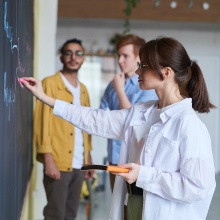AISA Colloquium Schedule
Upcoming Events - Overview
Asst. Prof. Justus Bogner, Vrije Universiteit Amsterdam
The Challenge of Designing High-Quality AI-Based Systems: A Software Architecture Perspective
While artificial intelligence (AI) and machine learning (ML) techniques are increasingly maturing, it remains very challenging for industry to develop production-ready AI-based systems and to operate and maintain them for longer periods of time. Even though ML models may only be a small piece of these systems, they nonetheless have a profound impact on their functionality and quality attributes, which can be difficult to manage. In this talk, I will briefly introduce how software engineering for AI-based systems (SE4AI) has emerged to try to tackle these problems. I will then take a software architecture perspective to present my research efforts in this field. I will touch upon technical debt, antipatterns, design patterns, and lastly green AI.
Access information
May 16, 2024, 17:30-18:30, room: UN32.101.
About the speaker
Dr. Justus Bogner is an Assistant Professor in Software Engineering within the Software and Sustainability (S2) group at Vrije Universiteit Amsterdam, The Netherlands. He was a PhD student in the cooperative doctoral program "Services Computing", a joint initiative between the University of Stuttgart and the University of Applied Sciences Reutlingen, Germany. During and after his studies as well as throughout his PhD, he worked as a software engineer at Hewlett Packard and later at DXC Technology for more than nine years. After his PhD in 2020, he was a postdoctoral research scientist at the University of Stuttgart in Prof. Wagner's Empirical Software Engineering Group for 3 years, where he led the division "Software Engineering for AI- and Microservice-Based Systems" (SE4AI&MS). His main research interests are empirical software engineering, software architecture, and software quality (maintainability, evolvability, sustainability), typically applied to AI-based systems (SE4AI) and service- and microservice-based systems.
Prof. Heng Xiao, University of Stuttgart
Beyond Gaussian processes: Equivariant neural operator based estimation with uncertainties
Gaussian processes (GPs) are extensively applied across geoscience, engineering, and mathematics. However, their reliance on joint Gaussian assumptions introduces several limitations. In this study, we propose an alternative approach using equivariant neural operators, which estimates the mean and covariance at inquiry points, paralleling the traditional Gaussian process framework. The designed neural operator adheres to essential mathematical constraints and properties traditionally associated with Gaussian processes, including (1) invariance to the ordering of observation and inquiry points, and the assimilation sequence of the data points, (2) positive semi-definiteness of the covariance matrix, (3) monotonic decrease of uncertainty with observation data. The neural operator approach addresses the intrinsic limitations of Gaussian processes and enhances the flexibility of functional approximation by learning directly from data.
Access information
June 12, 2024, 15:45-16:45, room: UN32.101.
Prof. Heng Xiao holds a bachelor's degree from Zhejiang University, China, a master's degree from the Royal Institute of Technology (KTH), Sweden, and a Ph.D. degree from Princeton University, USA. From 2009 to 2012, he worked as a Postdoctoral Researcher at ETH Zurich, Switzerland. He joined Virginia Tech, USA, in 2013 as an Assistant Professor and was promoted to Associate Professor with tenure in 2020. In 2022, he moved to the University of Stuttgart, Germany, to take up a professorship in Data-Driven Fluid Dynamics. His research focuses on turbulence modeling using data-driven methods, including data assimilation, machine learning, and uncertainty quantification.
Prof. Andreas Hotho, Universität Würzburg
Adopting Deep Learning: From Detecting Anomalies to Climate Modeling
Data and digitalization affect many areas of our lives and drive the development of our society. With the growing amount of data, it is not only important to learn how to represent all this data properly. Rare events are becoming increasingly important and signal important information. But they are hidden in huge data sets. Motivated by real-world problems in industry, such as occupational fraud, or in society, such as climate change affecting agriculture, new anomaly detection will be introduced together with XAI methods. This will be complemented by the new ConvMOS approach, a regression method for imbalanced data to reduce errors in climate model output statistics for better estimation of extreme precipitation events, and novel approaches using global weather models to predict NDVI ecosystem parameters. Finally, we show how climate information can be used for local agriculture to better understand the impacts of climate change.
Access information
July 17, 2024, 15:45-16:45, room: UN32.101.
About the speaker
Andreas Hotho holds the Data Science Chair and is the spokesperson of the Centre for Artificial Intelligence and Data Science (CAIDAS) at the Julius Maximilian University of Würzburg. He started his research at the AIFB Institute at the University of Karlsruhe, where he was working on text mining, ontology learning, and semantic web-related topics. His previous work also involved working at the KDE group of the University of Kassel on topics like data mining, semantic web mining, and social media analysis. In recent years, he has conducted research in various areas of data science. Core research areas include NLP with the integration of knowledge into language models, the study of historical novels in cooperation with the digital humanities, the analysis of corporate data for recommendation systems or anomaly detection, as well as studies based on sensor data on air pollution, climate modeling, and bee behavior.
Former invitees
Winter 2023/2024
- Prof. Ludovic Noels, Université de Liège, Belgium
Summer 2023
- Prof. Ute Schmid, University of Bamberg
- Dr. Benjamin Paaßen, Humboldt-Unversität zu Berlin
Winter 2022/2023
- Prof. Mathias Niepert, University of Stuttgart
- Prof. Steffen Freitag, KIT
Summer 2022
- Prof. Emad Shihab, Concordia University, Canada
- Prof. Frank Hutter, Albert-Ludwigs-Universität Freiburg



